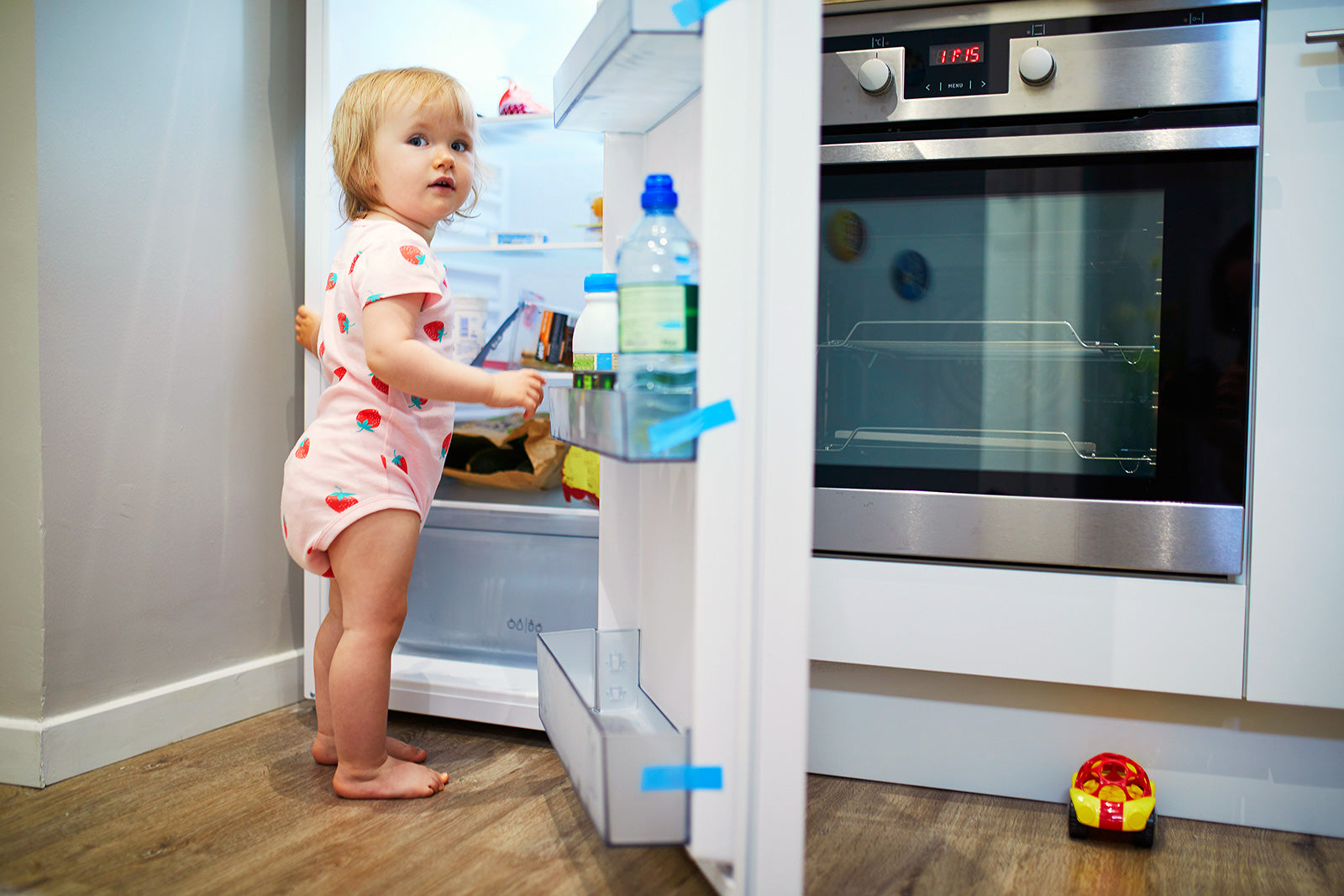When You Need to Wake Your Newborn to Feed

A lot of what you read will tell you to feed your baby on demand. Meaning, follow their cues as they’ll let you know when they’re hungry (and they usually will)! But there are times when it is either necessary or helpful to wake a sleeping baby to feed them.
“Never wake a sleeping baby,” may seem like sound advice, but there are actually situations where waking your little one up is what’s best. Here we’ll cover when you’ll want to wake your newborn to feed them, how long you can let a newborn sleep without eating and the best way to go about waking your newborn when it’s time to eat.

Times to Wake Your Newborn Baby to Feed Them
Waking up your newborn is common practice for new parents to ensure they’re getting enough to eat. It’s also advised for breastfeeding mamas so that the baby is at the breast often enough for the body to know to keep producing more milk. In addition to feeding your baby every 3 hours (including waking them to do so) always be sure to keep tabs on other signs that your baby is getting enough to eat.
1.) When Your Doctor Advises It
Before we go over the top reasons why you’d want to wake your sleeping baby to feed them, we first want to remind you that what your doctor tells you trumps everything we say. If you are unsure about anything that’s going on with your baby, you need to contact your child’s pediatrician. They will advise you on what’s best for your and your little’s unique situation - perhaps asking you to wake your baby more or less frequently than what is typically advised.
2.) Before Your Baby Has Regained His Birth Weight
Babies typically lose about 7 - 10% of their birth weight within the first few days of life, according to Kids Health. This is normal due to the extra fluid that a baby is carrying when they are born. At an average rate of 1-ounce in growth per day, a baby should have this regained by their two-week appointment. So until that time, it’s your job to give your baby all the calories they need to thrive and keep growing steadily as expected. By not letting your baby sleep longer than 3 hours at a time (yes, even at night) your baby has enough opportunities each day to get their calorie needs met to make this happen.
3.) To Establish Breastfeeding
Breastfeeding is all about supply and demand. When your baby demands it, your body produces it. In order for your body to keep getting the message that it needs to produce more milk, breastfeeding (or pumping as discussed here) around the clock is necessary to keep a steady milk supply for your little one. So be sure to wake that baby up to feed every 3 hours in those early weeks. Just remember, you can't nurse too often!
Wake to Feed, But Don't Schedule
The advice to wake a baby for the above reasons doesn’t mean we are suggesting putting your baby on a schedule (such as feeding every 3 hours no matter what.) You should still be feeding your baby on demand and when they show hunger cues! La Leche League writes, “Scheduling feedings for a baby who is exclusively nursing frequently throughout the day and night, especially during the first six weeks has been correlated with slow weight gain.”
Just know that this may end up being a lot sooner than every 3 hours with more than 8 - 12 feeds in a day. When your baby shows they’re hungry, feed them!
Instead, the advice is that you shouldn’t let your newborn baby go longer than 3 hours between feedings which means if your baby keeps sleeping past that mark, you need to wake them up to eat. As your baby grows, so does this amount of time.
How long should you let your newborn sleep without eating?
How long you can let your baby go between feeds depends on a variety of factors. Here are some to consider:
1.) Your baby’s age. Full-term babies who are younger than two weeks should be fed every 3 hours until breastfeeding is established and they’ve regained their birth weight. A baby under six weeks should not sleep longer than 4-5 hour stretches. Of course, if you’ve been given the all clear from your doctor to let your baby sleep longer, then that is the advice to take. If you have a preemie baby or other concerns, we advise you to reach out to your doctor to see how long you should let your baby go between feeds.
2.) Your baby’s weight gain. In the hospital the nurse will most likely have you feed your baby every 3 hours. This is also the guideline they give you when they send you home with your new little one. Until your baby’s 2-week check-up, this is ideally what you’ll want to follow which is when they’ll be able to determine if your baby is gaining weight at the desired rate. Getting to this point is a huge milestone for a baby and also for you in knowing you can let your baby go for longer stretches of sleep (about 4 - 5 hours) now that they’re getting nice and chubby. Weight measurements will continue to be “taken throughout your baby’s first year, and if baby is struggling to put on enough weight again, the doctor may advise you to feed more often again.
3.) Whether you’re breastfeeding or formula feeding. Babies who are formula-fed can usually go longer stretches between feeds than breastfed babies can. This is because breastmilk is digested more quickly than formula. However, you still need to follow the "feed every three hours" rule until your doctor has given the go ahead for longer stretches. After that, letting a formula-fed baby go a bit longer than a breastfed baby between feeds is normal (provided they have enough wet diapers and are gaining weight well.)
RELATED: The Best Way to Feed Your Baby Formula at Night
How do I wake my newborn to feed?
Newborns are sleepy little humans. Which means it may not be as easy as you’d think to wake them up when it’s time for them to eat (especially in the middle of the night). Here are some tips to help them out to ensure they are alert enough to feed and get that tummy nice and full.
Undress them down to their diaper. The chill of the air is often enough to wake a baby enough to eat. You can put a blanket around them to keep them warm enough once they begin to feed.
Use a cool washcloth on their face or body. Similarly, the coolness of a wet washcloth provides a great little wake-up call. I always felt a bit guilty doing this with my babies though.
Wake your baby when they’re in a light sleep. If you see your baby’s eyelids fluttering or moving around (even slightly) this is a good time to try to arouse them for their feeding.
Talk to your baby as you feed to keep them awake. Just a bit of sound might be all they need to wake.
Rub your nipple (or bottle nipple) against your baby’s mouth. This will alert your baby that it’s time to eat (try getting a few drops of colostrum or milk to touch his lips, too).
Switch sides or move your baby if they nod off. If you see your baby start to fall asleep, give them a break and put them upright to wake her up a bit. Then you can continue feeding again.
Pro Tip: If you aren't breastfeeding and need to prepare bottles for those nighttime feeds (from formula or pumped milk) we recommend always having a bökee to get them ready. Even though you need to wake your baby to feed them, most of the time they'll wake on their own. At that point you'll need to prepare a bottle one-handed and the bökee is perfect for that. (Use BLOG15 to save 15%)
Other Times You May Wake Your Baby
Waking your baby every three hours to eat in the early weeks is imperative to help them grow and thrive. But there are many other reasons why you might decide to wake your baby:
-
For a dirty diaper. You don’t need to worry about waking your baby for a wet diaper, if it doesn’t bother them, don’t let it bother you. Poop is a different story. Many babies will wake from this anyway, but if you do smell poop, you’ll want to change them soon. It they’re in the middle of a nap and you know they’ll be up in a bit, there’s no need to wake them prematurely, but if it’s the middle of the night, you’ll need to get them a fresh diaper (a calm change in the dark is your best bet here.) This will keep the chances of diaper rash down.
-
When it’s getting too close to bedtime. This article explains how long a baby’s last nap of the day should be as well as how much time to keep between the last nap and bedtime (depending on age). If your baby’s nap is edging to close to bedtime where they won’t have enough time in between to be sleepy before bedtime, it’s a good idea to cut that last nap short with a wake-up.
-
To prevent too long of naps. One major reason that babies wake frequently in the middle of the night or don’t seem tired is because they have their days and nights mixed up. If you let your baby take too long of naps, they naturally won’t be ready to sleep as much or for as long as stretches at night. As a rule of thumb, don’t let your newborn sleep longer than 3 hours at a stretch during daytime sleep, and closer to 2-2.5 hours is plenty at a time for an older baby.
- For the Dream Feed. Once your baby is past the earliest few weeks and your doctor has given you the go ahead to let your baby sleep in longer stretches, adding in a dream feed is a good idea. In order to do this, you will have to wake up your baby just enough for them to eat. Then you’ll put them right back down to sleep. The dream feed is something you can do to allow yourself more sleep when you head off to bed. For example - instead of feeding your baby at 7 (when they go to sleep) and midnight, you can feed them at 10 and 3 - allowing yourself a better stretch of sleep in the process.
You Won’t Have to Wake Your Baby Forever!
Those early days with a newborn are tough, there is no denying that. And when you’re already so exhausted it can be tough to rouse your own self to wake your sleeping little one. But keep reminding yourself that it’s temporary, and that as the weeks go on and your doctor keeps giving you the green light, you’ll be able to let your baby sleep to their heart’s content and feed them when they "demand" it.





